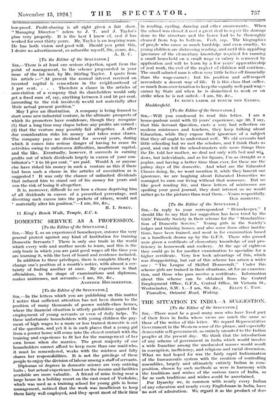[To the Editor of the SPECTATOR.] Sin g —In the letters which
you are publishing on this matter I notice that sufficient attention has not been drawn to the position of many thousands of poorer middle-class homes, where the financial situation is utterly prohibitive against the employment of young servants or even of daily helps. To these unfortunate householders with young children the pay- ment of high wages to a more or less trained domestic is out of the question, and yet it is in such places that a young girl from a poorer home will come into the closest contact with the training and experience to fit her for the management of her own house when she marries. The great majority of our
householders cannot of to keep more than one maid who, it must be remembered, works with the mistress and fully shares her responsibilities. It is not the privilege of these people to enjoy-the division of labour among a staff of servants.
Diplomas or degrees in domestic science are very enticing baits ; but actual experience based on the income and facilities available are more valuable. A friend of mine living near a large house in a holiday resort on the east coast of Yorkshire, which was used as a training school for young girls in home management, noticed that the work was insufficient to keep them fairly well employed, and they spent most of their time in reading, cycling, dancing and other amusements. When the school was closed it cost a great deal to repair the damage done to the structure and the house had to be thoroughly cleaned from top to bottom. Verb. sap. The biographies of people who cause so much hardship, and even cruelty, to young children are distressing reading, and until this appalling ignorance of the elementary knowledge required for running a small household on a small wage or salary is re moved by application and will to learn by a few years' apprenticeship of real work, the evil of the neglect of children will continue. The small salaried man is often very little better off financially than the wage-earner ; but his position and self-respect necessitate a decent way of life. It is this class that suffer; so much from over-taxation to keep the equally well-paid wav- earner by State aid when he is disinclined to work or on strike when he is not suited.—I am, Sir, &c., Huddersfield.
IN TENUI LABOR AT TENUIS NON GLORIA.










































 Previous page
Previous page